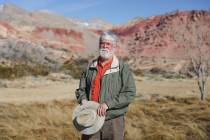A coaching career for the ages, forged in Beatty
The man who would become college football coaching royalty woke up early one morning in 1960, consulted a dog-eared road map and left his parent’s home in Butte, Montana. He was heading south to a place he’d never been before to start his first coaching job in the tiny mining town of Beatty, Nevada. 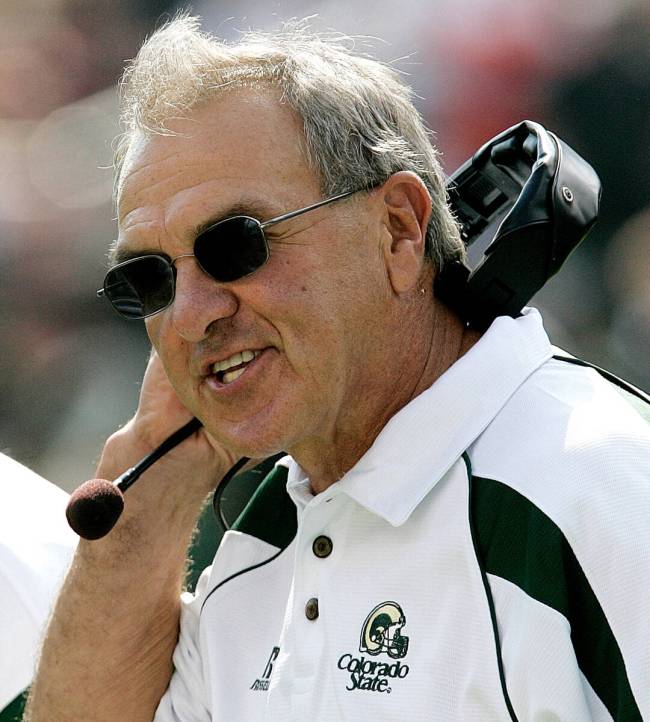
Louis Matthew “Sonny” Lubick was barely 23, a miner’s son who dreamed of coaching scholastic football. How could he know then that between 1993 and 2007 he would establish the Colorado State Rams as a regional powerhouse, winning six Mountain West conference titles, competing in nine bowl games, and being honored as Sports Illustrated’s National Coach of the Year in 1994? Or that he would send nearly two dozen players on to NFL careers, be inducted into the Colorado Sports Hall of Fame and have a playing field named in his honor in Fort Collins?
On that long-ago morning, he wasn’t even sure of the way to his destination in the rock-and-scrub heart of rural Nevada. He cut south across the Silver State’s ponderous midsection, through Winnemucca and Austin, steering his family’s hand-me-down Chevy, a red-and-white coupe with two doors and a stick shift, switching radio stations, listening to Elvis, glancing in the rearview mirror at his wavy square top, like the one the King wore. The miles piled on, basin and range, distant mountain after mountain, a car here and there, and a lot of space and time to think. Tonopah loomed like fool’s gold. “I thought I was home free,” recalls Lubick, now 85 and living in Fort Collins, “But I was still 90 miles away. I didn’t know what to expect.” At last, Beatty. With 400 residents, the town was a western cousin to Mayberry R.F.D., a two-hour drive and an eternity from Las Vegas, a remote town whose closest neighbor was desolate Death Valley. 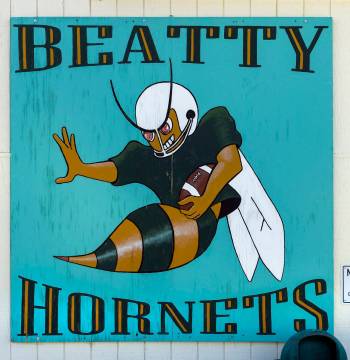
But for Lubick, Beatty was a punched ticket on the road to his dream. A few weeks before, he’d spoken by telephone with Ray Tennant, the local school superintendent, who described a position teaching English at a school with just 38 students in grades 7-12. He’d also help coach the school’s boys and girls basketball teams, boys baseball, and boys flag football. Heck, the kids didn’t even tackle. Still, the pay was good: $5,000 a year.
Tennant pitched Beatty like a Chamber of Commerce president. “Hey,” he said, “the flowers bloom all year round here.” But Lubick was already sold: “I’m thinking, ‘Hell, I’m going.’ You don’t think twice.”
Over the next two years, Lubick became a bona fide Beatty resident, teaching Shakespeare to its kids and giving more lessons after practice. He ate dinner at the Exchange Club or the Wagon Wheel, attended neighborhood barbecues, tooled around town listening to rock ’n’ roll on his car radio, joined the Lion’s Club, making friends he still keeps to this day, 60 years later.
Roy Bowditch, now 78, was just 16 when he played flag football for Lubick on a gravel field in town. “We didn’t even have uniforms; heck, we were lucky to have a football,” he says. “Sonny was just out of college, and he rolled up his sleeves to teach some rural kids something we didn’t know anything about — football.”
Not long ago, Bowditch ran into his old coach and teased him about his Beatty days. “I asked if he had coaching flag football on his résumé,” he said. “And he just smiled.”
• • •
Lubick liked the fact that Beatty had a mining heart, just like his hometown. Tom Welsh, who ran a gas station on the way into town, rented Lubick a two-bedroom apartment across the street. His roommate was named Roy Georgoff, and if Lubick suffered a bit of culture shock in Beatty, he figured Roy had it worse. He was older, had attended the University of Iowa, played in the Rose Bowl, had seen some of the world. Georgoff and Lubick became running buddies.
Georgoff, who taught social studies, was named head coach, with Lubick as his assistant. They were newcomers in a town devoid of eligible girls their age, but neither could have cared less. They were worried about doing a good job, rallying their players, as Lubick recalls, “so we didn’t get fired in the middle of the season.”
Lubick was impressed with his students. “They were bright kids,” he says. “They kept you on your toes.” Almost all of them had part-time jobs after school, so there wasn’t much time to shoot hoops or practice sports.
The girls basketball team was good, Lubick recalls, better than the boys squad. That first year, before the gym was built, they played their games on an outdoor court. “The blowing wind, that was our home court advantage,” he laughed.
Baseball was no less rudimentary, played on a dirt sandlot with a wooden backstop. The problem was equipment. “We didn’t want to lose baseballs and chased down every foul ball,” Lubick says. “If we had aluminum bats, they were precious. You made sure you had them all when you left.”
After all, Beatty fielded nascent sports teams just beginning their development, so there were lessons to impart from a former high school football offensive guard who admitted he was “average, at best.”
“I was a good team player,” Lubick says. “The newspapers said I was aggressive.”
Now his team was pulling flags instead of tackling. “We had a hard time finding the flag,” Bowdich says. “Coach lined us up and said, ‘I’ll run between you and I bet you won’t get my flag,’ and he did. He knew how to twist though our ranks. He was old enough to teach us. He had us pegged as a bunch of punks trying to make the right decisions in life.” 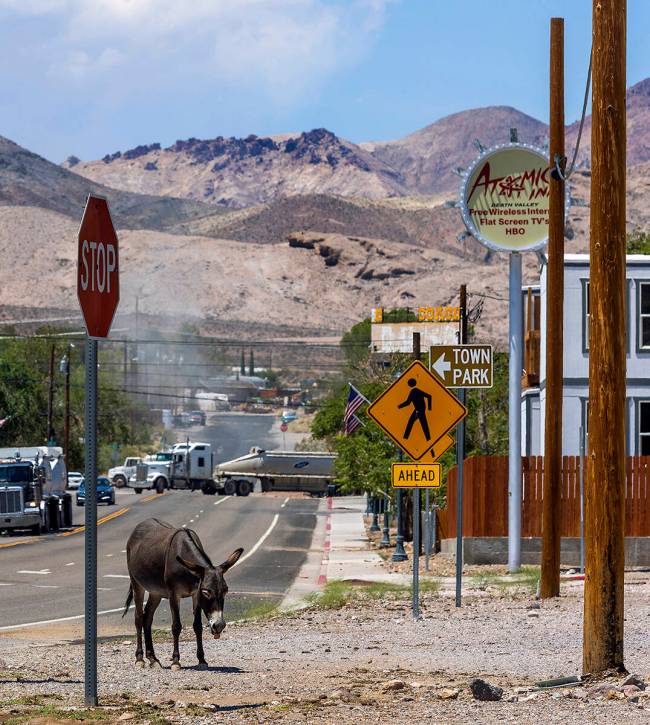
Lubick showed those farm and ranch kids how to win, Bowditch recalled. Before his tutelage, Beatty teams would get shellacked by out-of-town schools, fed lunch and sent home with a patronizing pat on the shoulder. “When Sonny made us competitive,” he said, “those teams weren’t as friendly to us.”
Off the field, Lubick and Georgoff cooked meals at home. Georgoff’s recipe for Hungarian goulash could last three or four days. Lubick made burgers and hot dogs. He’d do his shopping after school, chatting up the market owner in his white apron. They joined the Lion’s Club and collected money to buy eyeglasses for a needy kid or accompany young Barbara Charlantini, a sophomore who took part in a Las Vegas debate competition. “That’s what you did,” Lubick says. “You volunteered.”
On weekends, when there wasn’t a game, the coaches would watch college football on a little black-and-white TV. Or they’d take that crooked little left-hand turn that U.S. Route 95 makes on the south side of town and drive down to Las Vegas, to catch a few lounge acts and play some blackjack, always watching their money. Looking back, Lubick says, those were the last weekends for the rest of his coaching career that he ever had off. When Georgoff took another job, Lubick became coach. Beatty resident Gennie Lisle recalled how he helped the girls with their layups at lunchtime. They all looked up to Lubick, this adult from outside their universe. The mothers even baked cookies for the school coaches.
Early one March morning before St. Patrick’s Day in 1961, Lubick and his new assistant, a teacher named John Moriarty, walked around town, knocking on doors, drumming up support to buy a keg of green beer to serve at the Exchange Club. “They had a trumpet and a bass drum and woke people up,” says Gennie’s husband, John Lisle. The pair didn’t exactly make music, he added, “but they made noise.”
When the teams played on the road, Lubick and principal Wayne Whitten would carpool with the players, but most days even the nonplayers wanted to go, so Lubick got his chauffeur’s license and drove the school bus.
And nobody was more pleased than Coach Lubick when the scheduling gods gifted an away game down in pulsating Las Vegas. In his two years in Beatty, Lubick took his basketball team to play against the freshman squads at such powerhouses as Rancho and Western high schools. “I think I was more excited than the kids were to play those games,” he says.
But there was the little matter of getting there. Lubick recalls being skittish behind the wheel of that big yellow bus, packed with schoolchildren. The first part was easy — there was only one stoplight between Beatty and the Strip, but Lubick’s knuckles turned white when he hit city limits. After games, he’d head toward the Golden Nugget to take his players to the all-you-can-eat buffet, searching out a place to park where he didn’t have to back up, two questions always on his mind: “Where do I park this thing?” and “How do I get out of here?”
Once inside, he’d have to pinch himself: Here he was, steps from the card tables, slot machines and the cigarette girls, without a moment to indulge. An hour later, he’d pack his wards back onto the bus, close the swinging door and lumber northward toward home.
Looking back, among all those games and practices and life lessons, Lubick recalls the time he took his boys basketball team north to play a vaunted team from Virginia City, a squad that had even made the pages of Sports Illustrated for having several undefeated seasons.
Lubick read that the mighty Muckers — a mining term — had scored 100 points a game and told Principal Whitten that he couldn’t imagine having that many points scored against him. How shocked he was when the Beatty boys won the tipoff and a scrappy guard named Gary Brown flipped up a shot that somehow went in — with the foul.
Beatty 3, Virginia City 0.
“I wanted to take a picture of the scoreboard and then get the hell out of there and go home,” Lubick recalls.
He probably should have. The score after the first quarter was 25-3, and the final, 76-20. But Beatty, Lubick now says proudly, held the big boys to under 100 points.
Yet there were times when the young coach was forced to make hard decisions. Once, he’d heard that John Shorter, the school’s best athlete, was drinking beer after school.
“Well, I was gonna be the tough-guy coach, so I benched him for the next away basketball game in Gabbs,” he said. The disciplinary move did not go as planned. Beatty got shellacked. “If we’d had John, we would have won,” he says. “He was up in the stands, and I was tempted to turn around and tell him, ‘Go suit up. You’re going in.’ But I didn’t. I did what I knew I was supposed to do.” 
Now 78 and a great-grandfather of six, Shorter recalled being in the stands that day, feeling helpless. He’d grown up playing basketball around Carson City, used to bigger schools and nice facilities. Beatty didn’t even have a gym when he arrived. Now here was a coach who was doing good things, and there he was on the bench.
“He’d kicked me off the team and I couldn’t do anything about it,” Shorter says. “He told me I was off, I was off. And for a good reason. I had to accept it.”
The two mended their relationship. Shorter now recalls how Lubick taught the players never to take themselves too seriously. “He coined the phase ‘We’re hicks from the sticks.’ If we got beat bad and anyone asked us the score, he’d tell us to cover our mouths and mumble the numbers.”
When Shorter graduated in 1962, Lubick gave him a yearbook photo with an inscription that still makes the former student laugh. Not long before, Shorter had scored high marks on a history test Lubick had given. What Lubick didn’t know was that Shorter had stolen the answers from his desk. Lubick was bragging about the surprise achievement when Shorter’s brother, Ryan, whom the kids called “Shorty,” revealed the truth. “He ratted me,” Shorter says.
Not long before graduation day, Shorter received the photo, which Lubick inscribed on the back: “To the Ace of my History Class who almost fooled me. Just two weeks more.”
Around that time, Lubick got a call from a high school football powerhouse back in Butte. They needed a teacher and an assistant coach. Was he interested?
It was a hard call, but Lubick went.
“You’re in this small town, happy with what you’re doing and people treated you well,” he says. “But we all had dreams of moving up to a bigger school and conference. Suddenly, I had the opportunity and I told myself, ‘You gotta go.’ ” 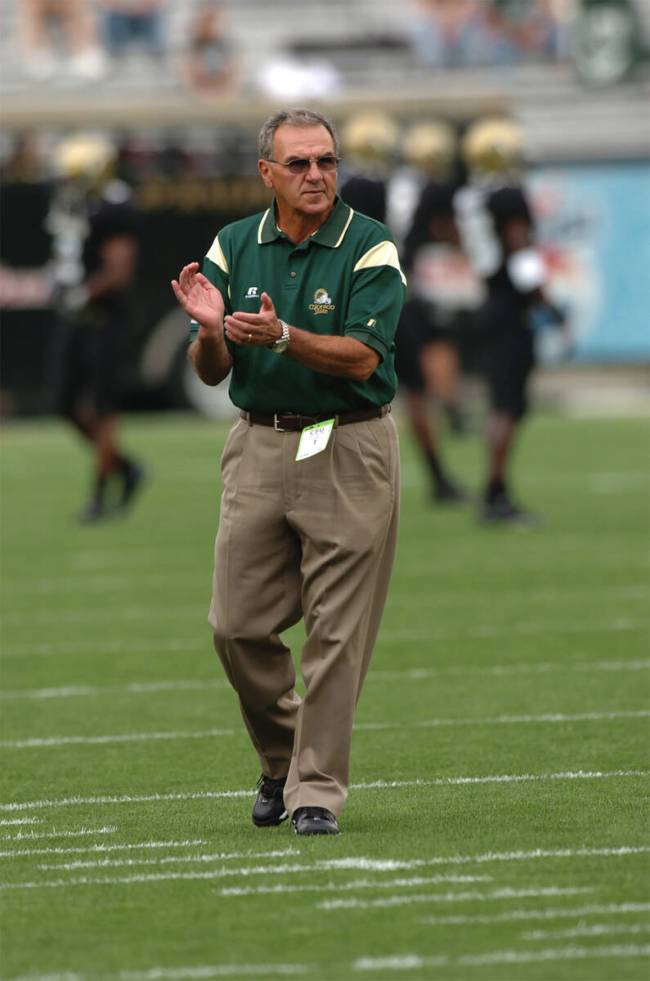
• • •
Sixty years later, the emotional bonds that a young out-of-town coach forged with his adopted community are still there, still strong. Lubick and his old players and compatriots keep in touch by phone and through personal visits. For years, whenever Lubick brought his Colorado State Rams to Reno or Las Vegas, a contingent of Beatty regulars would come and show their support. Others made the long drive to Fort Collins to stop in at Lubick’s steakhouse there. Roy Georgoff even made a surprise visit when Lubick was defensive coordinator for the University of Miami Hurricanes during the dynasty years of the early 1990s.
Meanwhile, Lubick made a point to keep in touch with his aging flock, taking the news hard when someone died of cancer or in a car wreck. In 1997, he returned to Beatty to speak at the high school graduation ceremonies. John and Gennie Lisle arranged it. Afterward, they had a party at the Burro Inn and 25 people showed up to celebrate their mentor. They all have signed copies of Lubick’s 2002 coaching memoir, Not So Fast, Sonny.
“They gave me my first chance,” Lubick says of Beatty residents. “I learned so much from them. There was a bonding, that’s what I remember.”
John Lisle, who recently retired after a long career as a science teacher in Beatty, pays his old coach the highest compliment: “I tried to pattern my teaching after Sonny.”
Lubick still keeps office hours at Colorado State. And his former players at a small Nevada town are still rooting him on. “He really cared about us. He didn’t give up,” Bowditch says. “And I’m just so happy he achieved his dream.”
• • •
Decades ago, when Lubick brought his Montana State team to Reno for a game, Shorter greeted the old coach, saying he was getting to retire in his early 50s from a career at the Nevada Department of Transportation. He recalls Lubick running off down the stadium tunnel to catch his players, but not before turning back to shout, “You’re too young to retire!”
In the end, those two crazy years in Beatty taught an emerging football coach a lesson he carried with him for the rest of his career: He learned that creating a tight-knit community was more important than the final score, that traveling first class was a privilege, not a right. He took nothing for granted.
Later, as a successful college coach, Lubick didn’t have to drive the team bus or apply the yard markers on the playing field. But his Beatty days made the good life all that much sweeter. “When players griped about two guys sharing a room, I wanted to tell them that those kids from Beatty were split four to a room, and that they were happy about it. But I didn’t. Because they wouldn’t have believed it.”
The old coach laughs again at the memories. “Those kids from Beatty were just happy to play. If they lost, it wasn’t the end of the damned world.” ◆






